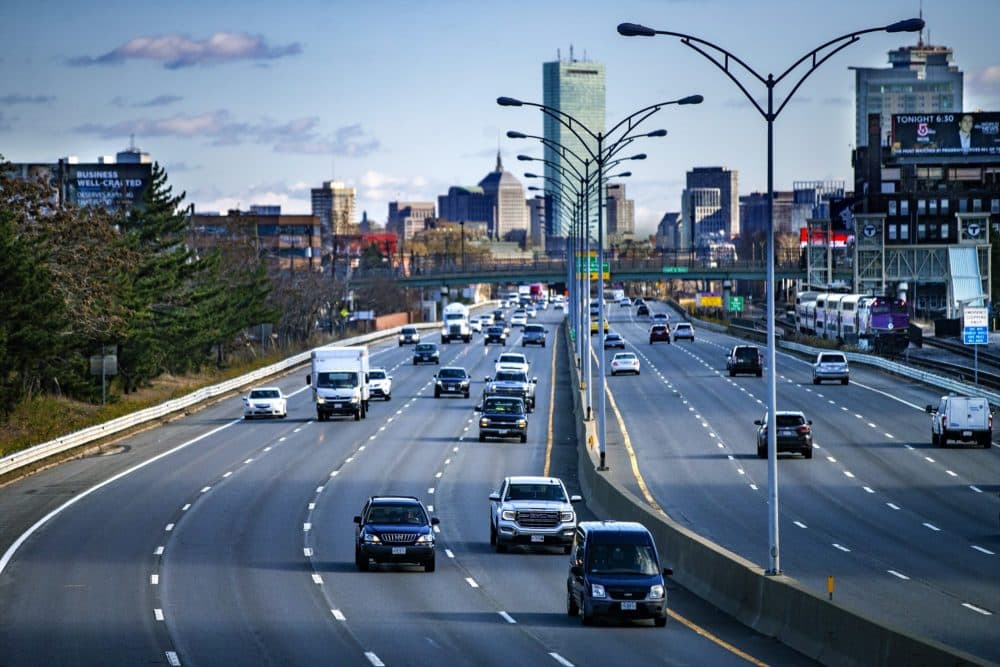Advertisement
Massachusetts pulled out of a regional emissions pact. Here's what that means

The Massachusetts effort to achieve net zero emissions by 2050 has suffered a big setback. Last week, Gov. Baker took the state out of the Transportation Climate Initiative, a multi-state initiative to cut carbon emissions in the transportation sector.
Evan Horowitz, the executive director at the Center for State Policy Analysis, joined WBUR's Weekend Edition to discuss what this means.
Interview Highlights
What is the TCI and what happened?
"It was originally a multi-state effort to put a price on the carbon in motor fuel. ... There are lots of cars across the Northeast. Those cars emit a lot of carbon emissions along with other tailpipe emissions. That stuff is really bad for the environment, bad for people's health. So a bunch of states thought it would be a good idea to put a price on it, make people effectively pay for some of the cost of all that carbon and thereby reduce the amount of carbon and reduce the amount of other emissions ... reduce climate change and help communities that are affected by pollutants.
"States started dropping out, a lot of states last December and a few states trickling over the last year ... And it's very hard to run a regional program as one state."
What was the opposition to the TCI?
"The way they tried to frame it — and it was, I think, very clever politically to try to frame it this way — was to say that TCI, yes, it puts a price on emissions, but really what it does is it just kind of caps the total amount of emissions in the region and it sells the right to emit to various people and it raises money and it uses that money to make all kinds of interventions, like new bike lanes, like new transit investments, electronic vehicles, electronic busses, charging stations — things that will make our transit and transportation systems a lot greener. And that sounded very appealing. But to emphasize that point, they also de-emphasize the point that it was going to raise prices for motor fuels. And the more people kind of realized that, the more opposition there was."
"The state has to think about the gas tax. I know that's what tanked this effort at a regional level, but it's very, very hard to get to net zero without raising the price of transportation."
Are there ways to achieve net zero emissions by 2050 without raising the price of gasoline?
"The short answer is it would be a lot better if we could raise the price of gasoline — like that's the best, clearest, most direct way to do it. It's obviously very, very tricky politically, especially at a time when gas prices are very high on their own from market forces. But, you know, gasoline is really, really bad for the planet and really, really bad for the people who live [near] roadways. So if you raise the price of it, people use less of it, and that has lots of good ends. But you know, that seems to be off the table. That leaves other options. I mean, there are lots of long term options, but it really pushes things towards the sort of technology side. We've got to make lots of changes to the kinds of cars we buy — I mean, subsidies. But also lots of investments in wind energy. Maybe maybe nuclear fusion is finally ready for prime time in the next 15 years. But the whole shift means we really are just much more dependent on the technological innovations to reach that goal."
Gov. Baker had called the initiative an essential part of the state's effort to address the largest source of greenhouse gas emissions. So without the TCI, what does the state do now?
"The state has to think about the gas tax. I know that's what tanked this effort at a regional level, but it's very, very hard to get to net zero without raising the price of transportation — carbon emissions. And gas taxes are the most immediate way to do it."
Can you put this in context for us? How difficult is this on the continuum of climate change setbacks? Where do things stand?
"Well, nothing that happens in Massachusetts is significant on the continuum of climate change setbacks. Massachusetts is a small state and a small emitter in global terms, and the fight for climate change is not going to be won or lost here. We can be part of it. We should be part of it. We can provide models for other states and other countries. We can join regional pacts that, you know, might work as pilot programs for other places. But that's really the role that we're playing as a contributing agent rather than a determinative factor in the race to save the planet."
This segment aired on November 21, 2021.
